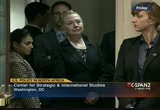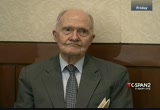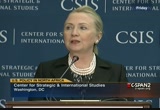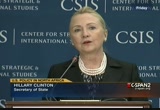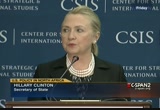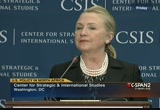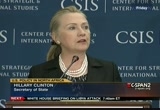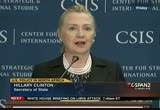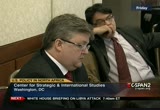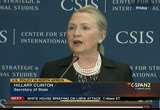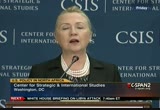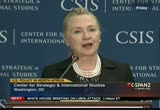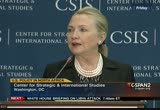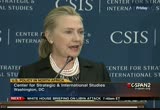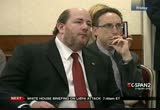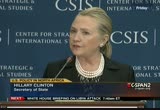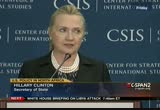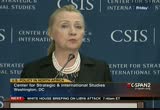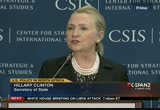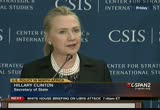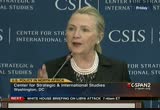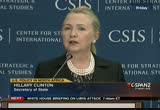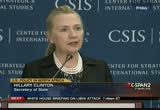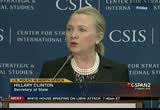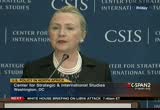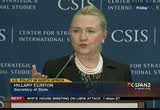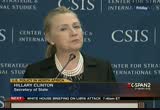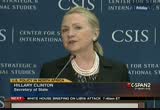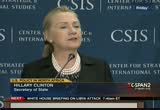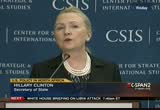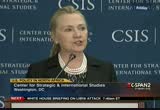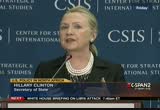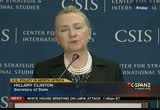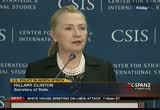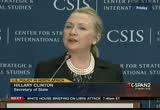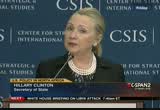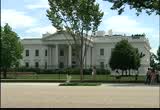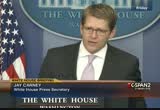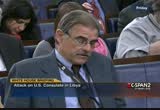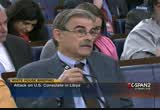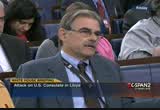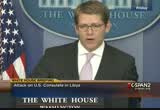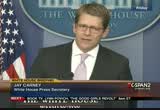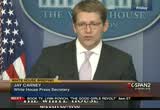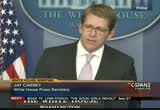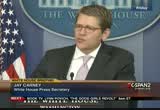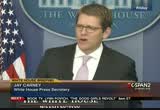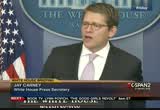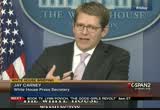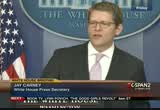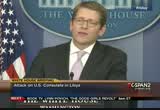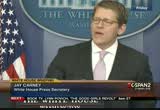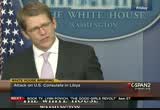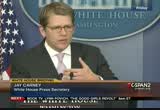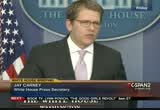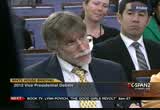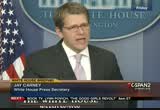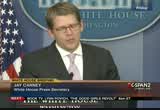tv C-SPAN2 Weekend CSPAN October 13, 2012 7:00am-8:00am EDT
7:00 am
new york. she not only has the highest approval rating of any member of the u.s. cabinet, she has as well topped a gallup poll as the most admired woman in the world, besting the previous record of eleanor roosevelt who held the title for only 13 years. as america continues to engage in north africa, we have been extremely fortunate to be served by a public servant. clinton engage in these challenges day in and day out and cares deeply about the issues and how they affect america's interests and the leaves in an even brighter future for the people of the middle east. please join me in welcoming secretary of state, the hon. hillary rodham clinton. [applause]
7:01 am
>> thank you. thank you all. thank you very much. and a special word of thanks to a friend and someone who i admire greatly, general snowcroft. his many years of distinguished service to our country is a great tribute in every respect. thanks also to john alterman and csis for hosting this conference on maghreb transition and seeking stability in an era of uncertainty. i wish to acknowledge dr. tehrat for his involvement in this important conference and members of the diplomatic corps as well. what are we here? why is this conference so
7:02 am
timely? to start with, what happens in this dynamic region has far reaching consequences for our own security and prosperity. we know very well that it is most important to the people of this region whose aspirations and ambition deserve to be met. but recent events have raised questions about what lies ahead, what lies ahead for the region, what lies ahead for the rest of us who have watched with great hope. the events that have unfolded. terrorist attack in benghazi, these and other scenes of anger and violence have understandably led americans to ask what is happening to the promise of the
7:03 am
arabs spring and what does this mean for the united states? i certainly think it is important to ask these questions and to seek answers as you are doing today. let me on a personal note start with what happened in benghazi. no one wants to find out exactly what happened more than i do. i have appointed an accountability review board that has already started examining whether our security procedures were appropriate, whether they were properly implemented and what lessons we can and must learn for the future. we are working as thoroughly and expeditiously as possible, knowing that we cannot afford to sacrifice accuracy to speed and of course our government is sparing no effort tracking down
7:04 am
the terrorists who perpetrated this attack. and we are focused as we must on what needs to be done to protect our people and our facilities. we had another terrible attack yesterday. i strongly condemn the killing of a long time yemeni employee at our embassy. we are working with yemeni authorities to investigate this and bring those responsible to justice as well but throughout all of this we must not only focus on the headlines. we have to keep in mind the trend lines and remain focused on the broader strategic question posed by democratic transitions and their impact on american interests and values. let me start by stating the
7:05 am
obvious. nobody should have ever thought this would be an easy road. i certainly didn't. however, it is important to look at the full picture, to wave of violent acts of a small number of extremists against the aspirations and actions of the region's people and government. that broader view supports rather than discredits the promise of the arab revolution. it reaffirms that instead of letting mobs and extremists speak for entire countries, we should listen to what the elected governments and free citizens are saying. they want more freedom, more justice, more opportunity, not more violence. and they want better relations not only with the united states but with the world.
7:06 am
i have no illusions about how complicated this is. american foreign policy has long been shaped by debate over how to balance our interests and security and stability with our values in supporting freedom and democracy. recent revolutions have intensified fees by creating a new birth of freedom, but also by unseating old partners and unleashing unpredictable new forces. as i said last fall at the national democratic institute, we have to be honest that american policies in the region will always reflect the full range of our interests and values, promoting democracy and human rights and defeating al qaeda. defending our allies and
7:07 am
partners and also ensuring a secure supply of energy. and there will be times when not all of our interests and values of line. we worked to align them but we do so acknowledging reality. and it is true that we tailor our tactics for promoting democratic change to conditions on the ground in each country. after all, it would be foolish to take a 1-size-fits-all approach regardless of circumstances for historical trends. but in the long run, the enduring cooperation we seek and that our interests and our values demand is difficult to sustain without democratic legitimacy and public consent. weeks before the revolution in egypt began i told arab leaders
7:08 am
gathered at dohop that the foundation's regions were sinking into the sand. it was clear even then that the status quo was unsustainable. that refusal to change was itself becoming a threat to stability. for the united states supporting democratic transition is not a matter of idealism. it is a strategic necessity. and we will not return to the false choice between freedom and stability. and we will not pull back our support for the emerging democracies when the going is rough. that would be a costly strategic mistake that would, i believe, undermined both our interests and our values.
7:09 am
we recognize that these transitions are not america's to manage and certainly not ours to win or lose, but we have to stand with those who are working every day to strengthen democratic institutions, expand universal rights and drive inclusive economic growth. that will produce more capable partners and more durable security over the long term. today these transitions are entering a phase that must be marked by compromise more than confrontation, by politics more than protests, politics that deliver economic reform and jobs so people can pursue their livelihood and provide for their family. politics that will be competitive and beaten heated but rooted in democratic rules and norms that apply to
7:10 am
everyone. islamists and secularists, muslims and christians, conservatives and liberals, parties and candidates of every stripe. everyone must reject violence, terrorism and extremism, abide by the rule of law, support independence, judiciary's and uphold fundamental freedom. upholding the rights and dignity of all citizens, regardless of faith, ethnicity or gender, should be expected. of course, we look to government to let go of power when their time comes, just as the revolutionary libyan transitional national council did this past august, transferring authority to the newly elected legislature, in a
7:11 am
ceremony ambassador chris stevens cited as the highlight of his time in the country. achieving genuine democracy and broad base growth will be a long and difficult process. we know that from our own history. 235 years after our own revolution we are still working towards that more perfect union. so one should expect setbacks along the way. times when some will surely ask if it was all worth it. but going back to the way things were in december of 2010 isn't just undesirable, it is impossible. this is the context in which we have to view recent events and shape our approach going forward. and let me explain where that
7:12 am
leads us. since this is a conference on maghreb that is where i will focus because that is where the arab revolution started and where an international coalition helped stop a dictator from slaughtering his people, and we're just last month we saw such disturbing violence. but let's look at what is actually happening on the ground, especially in light of recent events. we have to as always be clear eyed about the threat of violent extremists them. the year of democratic transition was never going to drain away reservoirs of radicalism buildup through decades of dictatorship. nor was that be enough time to stand up fully effective and responsible security forces to replace the repressive ones of the past. as we warned from the beginning, there are extremists who seek to
7:13 am
exploit periods of instability and hijack these democratic transitions. all the while al qaeda and other terrorist groups are trying to expand their reach from a new strongholds in northern mali, that is not the full story. far from it. the terrorists who attacked our mission in benghazi did not represent the millions of libyan people who want peace and deplore violence. in the days that followed, tens of thousands of libyans ford into the streets to warn ambassador stevens who has been a steadfast champion of their revolution. use of the signs. one read thugs and killers don't represent benghazi or islam. on their own initiative, the people of benghazi overran extremist bases and insisted
7:14 am
that militias disarmed and decks of the rule of law. that was as inspiring a sight as any we saw in the revolution ended points to the promise of the arabs spring, by starting down the path of democratic politics. libyans and arabs across the region have firmly rejected the extremists argument that violence and death are the only way to reclaim dignity and achieve justice. in tripoli, the country's transitional leaders condemned the attacks, fired the top security officials responsible for benghazi and the government issued an ultimatum to melissas across the country, disarm and disband in 48 hours or face the consequences. as many as ten major armed
7:15 am
groups complied. melissas and extremists remain a significant problem in libya, but there is an effort to address it that has now taken hold throughout the country. as libya grapples with the challenges of forming a government the international community needs to support its efforts to bring these militias to heal and provide security for all of its citizens. consider tunisia, the birthplace of the arab revolution. last year and islamist party won a plurality of the votes in an open, competitive election. some in washington took this as an omen of doom but these new leaders formed a coalition with secular parties, and promised to uphold universal rights and
7:16 am
freedoms including 4 women. the united states made it clear we would be watching closely and would assess the government by its actions, not its words. this past february, students and civil society activists shared with me their fears about extremists seeking to derail their transition and lasting democracy but also their hope that responsible leaders and accountable institutions would be strong enough and willing enough to turn back that challenge and indeed we have seen an intense debate play out in tunisian society. for example, early drafts of the new constitution labels women as complementary to men, but to nietzsche's active civil society raised strong objections and eventually the national
7:17 am
constituent assembly amended to recognize women's equality. society is wise to remain vigilant and exercise their hard-earned rights to safeguard their new democracy. like the hundreds of tunisian women who recently took to the streets to protest on behalf of a woman charged with indecency after she was raped by a police officer. these competing visions of tunisia's future were put to the test. violent extremists attacked the u.s. embassy and burned the american school nearby. how do tunisian people and governments respond? first the government increased security around our embassy and promised to assist with repairs to the school which they have done. then they publicly committed to confront violent groups and prevent tunisia from becoming a
7:18 am
safe haven for international terrorism. following through on these pledges is essentials. those responsible for the attacks must be brought to justice. the government must provide security for diplomatic missions and create a secure environment for foreign residents and visitors, and the rule of law must extend to everyone throughout the country. the country's leaders also took to the airwaves, newspaper pages and even facebook and twitter to denounce both the attacks and the extremist ideology behind them, putting their own political capital on the line. the foreign minister flew to washington to stand with me and publicly condemn the violence. and so we continue to support those changes that are occurring in libya and tunisia and those
7:19 am
leaders and citizens who understand what is expected of them if they are to fulfil their own hope. the situation in the rest of the maghreb is different. morocco and algeria have not experienced revolution, but recent events have tested their values and resolve. last year when citizens of morocco called for change, moroccan society under king muhammed vi answered with major constitutional reform followed by early elections and expanded authority for parliament. and islamist party leads the new ruling coalition, along with a variety of other parties. after 13 years in the opposition. we have been encouraged that feeders sought to engage all moroccans and focus on creating
7:20 am
jobs and fighting corruption and we continue to urge them to follow through on their commitments for political and economic reform. last month with anti-american protesters in the streets across the cities of morocco the foreign minister travelled to washington for our first-ever strategic dialogue. he could have avoided the cameras but instead strongly condemned the attack in benghazi, embraced a broader partnership with the united states and pledged that his country would continue working towards democracy and the rule of law. algeria also has much to gain by embracing the changes taking place around it and we have seen some progress. the government held parliamentary elections in may and invited international observers to monitor them for the first time. it moved quickly last month to
7:21 am
protect diplomatic missions including the u.s. embassy and to defuse tensions in the streets. but still algeria has a lot of work to do. up hold universal rights and create space for civil society, a message i delivered at the highest level in person in february. what do these snapshots and stories from across the region tell us? on the one hand, last month, strains of extremism that threaten those nations as well as the broader region and even the united states. on the other hand we have seen actions that would have been hard to imagine a few years ago. democratically elected leaders and free people in arab countries standing up for a peaceful pluralist future. it is wade too soon to say how these transitions will play out.
7:22 am
but what is not in doubt is that america has a big stake in the outcome. last month at the united nations general assembly in new york i met with leaders from across the region and i told each of them that the united states will pursue a strategy to support emerging democracies as they work to provide effective security grounded in the rule of law for economic growth and bolster democratic institutions. we have made those three priorities the hallmark of america's involvement in the region. we have convened donor conferences to coordinate assistance, leverage new partnerships to the g-8, a community of democracy, the o a cd and stepped up engage in with the arab league signing the first-ever memorandum of understanding for strategic dialogue between them. but we recognize that words whether they come from us or
7:23 am
others are cheap. we talk about investing in responsible leaders and accountable democratic institutions have to be followed by actual investment. so we have mobilized more than $1 billion in targeted assistance since the start of the revolution. the obama administration has requested from congress a new $770 million fund that would be tied to concrete benchmarks for political and economic reform. and i again urge congress to move forward on this priority for. but let me briefly address the 3 parts of our strategy starting with security. the recent riots and lawlessness underscore the challenge of safeguarding public safety in free society and reforming security forces. for decades those forces
7:24 am
protected regimes. now there job is to protect citizens, especially against the threat from violent extremists. for some time al qaeda and the islamic maghreb and other terrorist groups have launched attacks and kidnappings from northern mali into neighboring countries. now with the chaos and ethnic conflict allowing these groups to carve out a larger safe-haven, seeking to extend their reach and their network in multiple directions. we are using every tool we can to help our partners fight extremism and meet their security challenges. we recently embedded additional foreign service officers with regional expertise into the u.s. africa command to better integrate our approach. across the region diplomats, development experts and military personnel are working hand in hand. across the region we are partnering with security officials of the new
7:25 am
government's who are moving away from the repressive approaches that helped fuel radicalization in the past and we are trying to help develop strategies grounded in the rule of law and human rights. we are helping border guards upgrade their equipment and tighten their patrols so that weapons don't flood the region even more than they already have. we are helping train prosecutors build forensic labs that can produce evidence that stand up in court. last month just days after the riots in tunis we launched a new partnership with tunisia to train police and other justice officials and we were very pleased that tunisia agreed to host a new international training center that will help officials from across the region develop means to protect their citizens's security and the birdie. the nations of the maghreb are not the first to struggle with
7:26 am
the challenge of protecting a new democracy. one of the lessons we learned around the world is training, funding and equipment will only go so far. it takes political will to make the hard shoelaces and demand the accountability that is necessary for strong institutions and lasting security and it takes changes in mind set to make those reforms stick. in all my conversations with high ranking officials in these countries, i recognize particularly in tunisia, the people i'm talking to are often victims of security forces, in prison, beat and, in some cases tortured. for them all of a sudden to find themselves faced on the side of security forces, even ones that are of the new regime, takes a
7:27 am
mental change and they have admitted that it is a responsibility that they now understand they must assume. the united states is also stepping up our counterterrorism efforts, countering their ideology, denying the recruits, transparent counterterrorism partnership is building the capacity of ten countries to better work together to disrupt terrorist networks and prevent attacks. we are expanding our work with civil society organizations in specific terrorist hotspots, particular villages, prisons and schools. the maghreb economic and social challenges fuelled the
7:28 am
revolution and calls for reform. in order to succeed the emerging democratic governments need to show they can deliver concrete results. that is the secondary we are focused on. working with small and medium-sized enterprises which create jobs and alternatives to radicalism bringing women and young people into the formal economy, providing capital and training for on for for nors, helping emerging democracies update their economic regulations, investment laws and trade policies so private sectors can flourish. establishing a tunisian american enterprise fund with an initial capitalization of $20 million to stimulate investments in the private sector and provide businesses with needed capital. the private investment corporation is offering $50 million in loans and guarantees and the millennium challenge corp. is helping
7:29 am
address long-term constraints to economic growth. we provided expert training for small business owners and job training to hundreds of young to legions and i am particularly proud of the new $10 million scholarship fund which will launch in august to help tunisian students study at american universities and colleges. we look forward to working on economic issues with the new libyan government once it is formed. one of our top priorities is helping nations trade more with each other. that will create new jobs for their citizens and markets for their products but today north africa is one of the least integrated regions in the world. it doesn't have to be that way. opening of the border between algeria and morocco would be an important step moving toward that integration. the third key area is
7:30 am
strengthening democratic institutions advancing political reform. not an easy process. as we can see in the difficulty in forming a government in libya and political progress has to grow from the inside, not imposed from the outside or abroad but there are ways we can and are helping. in libya the united states has trained hundreds of lawyers and civil society activists on the election laws and offered tutorials to campaign managers in the run-up to the recent election. now we are encouraging civil society to fully engage in drafting a new constitution that will protect the equal rights of all libyan citizens. similar efforts are under way across the maghreb tailored to local needs and conditions. none of this is happening in a vacuum. the transition occurring in the maghreb are linked as you well
7:31 am
know with developments across the wider middle east. egypt, the largest arab nation, cornerstone of the region, up we have seen its new elected leadership say the success of egypt's democratic transition depends on building consensus and speaking to the needs and concerns of all egyptian, men and women of all faiths and communities. we stand with the egyptian people, universal freedom and protection and we have made a point that egypt's international standing depends on peaceful relations with its neighbors and also on the choices it makes at home and whether or not it fulfills its own promises to its own people. in syria the facade regime continues to wage brutal war against its own people even as territory slips from its grasp. i recently announced major new
7:32 am
contributions of humanitarian aid and assistance to the civilian opposition and we remain committed to with our like-minded partners to increase pressure on the regime. in yemen where we supported negotiations that eventually achieve a peaceful transition, of we are working to prevent al qaeda and other extremists from threatening these emerging fragile democratic institutions and prevent them also from finding of safe-haven from which to stage new attacks. when i've met with king abdallah of jordan we discussed the importance of continuing reform to move his country toward more democracy and prosperity. in all of these places and many others, the united states is helping the people of those nations chart their own destinies and realize the full measure of their own human
7:33 am
dignity. dignity is a word that means many things in different cultures but speaks to something universal in all of us. one egyptian observed in the wake of the country's revolution freedom and dignity are more important than food and water. when you eat in humiliation you can't taste the food. dignity does not come from avenging perceived insults especially with violence that can never be justified. it comes from taking responsibility for one's self and one's community and if you look around world those countries focus on fostering growth rather than fomenting grievance of pulling ahead. building schools instead of burning them. investing in their people's creativity, not encouraging their rage, and powering women, not excluding them.
7:34 am
opening their economies and societies to more connections with the water world, not shutting off the internets or attacking the embassy's. i remain convinced the people of the arab world to not want to trade the tyranny of a dictator for the tyranny of of mob. there is no dignity in that. the people of benghazi told the world loudly and clearly when they rejected the extremists in their midst what they hoped for. so did the leaders of libya when they challenge the militia and to nations who spoke out against violence and hatred. that is the message we should take from the events of the last month. i want to add and close with one more thought about what happened in benghazi. as you might expect, that is for me and all the men and women in the state department, very
7:35 am
personal. diplomacy by its nature has to be often practiced in dangerous places. we send people to diplomatic posts in the 170 countries around the world and some of those are in war and conflict zone. others and stable threats and no u.s. military presence. that is the reality of world we live in and we will never prevent every act of violence or terrorism or achieve perfect security. our people cannot live in bunkers and do their job but it is our solemn responsibility to constantly reduce the risks our people face and make sure they
7:36 am
have the resources they need to do those jobs we expect from them and nobody takes that more seriously than i and security professionals at the state department do. chris stevens understood that diplomats must operate in many places where soldiers do not or cannot, there are no other boots on the ground and security is far from guaranteed and like so many brave colleagues and those who serve in our armed forces as well, he volunteered for his assignment. our ambassador to syria was a salted in damascus by for a regime funds--funds but he met with peaceful protesters and serving as a living manifestation of america's supports and we drove to the
7:37 am
battered city of hama, people covered his car with flowers. people like chris and robert represent diplomacy and america at its and our best. they know that when america is absent, especially from the dangerous places, there are consequences. extremism takes root, our interests suffer and security at home is for rent and. we will continue sending our diplomats and development experts to dangerous places. the united states will not retreat. we will keep weeding and stay engaged in maghreb and everywhere in the world including hard places where america's interests and values are at stake. that is where we are and how to honor those we lost.
7:38 am
that is how we insure our country's global leadership for decades to come. thank you very much. [applause] >> at the white house briefing, spokesman jay carney was asked about joe biden's remarks on the details of the attacks against the conflict in benghazi. this portion of the briefing is about 20 minutes. >> good afternoon, everyone. good morning. thanks for being here. before we start i thought i would say and might in what you consider a point of personal privilege, setting aside assessments of winners and
7:39 am
losers. as someone who worked with the vice president for two years and traveled around the country, i took extreme pleasure in watching the debate because of the way he demonstrated his passion and his wisdom and the joy that he brings to the job of serving the american people as vice president and working with this president's to bring about positive change for the middle class and this country. he presented remarkably strong case for the policies this president has put in place, the right ones to move the country forward. it was an extraordinary day because it was distinct pleasure to bring my son to the nationals game yesterday.
7:40 am
i was not traveling -- to a great game. >> libya and the vice president's response, u.s. officials in libya asked for more security and the vice president replied that wanted more security but we did not know they wanted more security. that wasn't the testimony at the oversight on wednesday, conceded that she refused for more security. what did he mean by we? the administration? the white house? >> for himself, he meant the white house. the testimony you just referenced, no one testified about this matter, the
7:41 am
additional security were made to the president and the white house. these are issues appropriately handled by security professionals at the state department. if you look at the testimony plus hours about it, the request for personal made here, handles by security personnel at the state department. it is clear if you look in context what the vice president was responding to. >> after that testimony, might have conceded that the attack by what has largely been a political attack by republicans by congressman ryan to suggest the president and white house was responsible for assessing security in the diplomatic facility in benghazi and of course opprobrious these kinds of issues in the state
7:42 am
department's by security professionals and that was the context of the conversation. >> on a broader context, the argument given by expanded security from the state department is desire to turn over security, that desire to rely on national security is one the administration starts to refuse and withdraw from afghanistan. given the green on blue attacks in afghanistan, does it give the president paz, reconsider whether the sole motivation should be to withdraw troops even though the security impact is on our own people? >> there are a variety of issue areas the question cuts up on. let me go to this point.
7:43 am
as i said the other day, there is no question that an attack on a diplomatic facility that resulted in the deaths of four americans demonstrated there is not adequate security. that is why the president and secretary of state acted to take action to ensure diplomatic personnel around the world were protected and why the secretary of state at the president's direction created and accountability review board that will assess and investigate these issues regarding security, diplomatic facilities. secondly fifth, this president is very concerned about the safety and security of diplomatic personnel around the world. one way to measure that is in the budget priorities he has put forward in his budget and what he has done is he has fought every year to restore funding for diplomatic security that has
7:44 am
been cut by republicans especially in the house including congressman paul ryan. going back to last night's debate, whack of understanding our congressman paul ryan consistently supported and authored budgets that cut spending on diplomats security and if now takes a different position on these matters in the aftermath which is part of an effort to politicize what should not be politicized. this is a tragedy and an incident that is under investigation by the fbi and when it comes to diplomatic security and security of our diplomatic facilities by the accountability review board established by secretary clinton. more broadly this was a topic as a matter of policy that was discussed in an in lightning way in this debate. when it comes to afghanistan, president working with countless
7:45 am
hours eyes has established a policyallies has established a to draw down our forces in afghanistan and end that war by 2014. whether that is why policy and this president is committed to bringing our forces home from afghanistan. the purpose the vice president said, of setting a deadline is to make it clear to the government kabul in and baghdad iraq, they began to take increasing responsibility for security. when it comes to fighting or dying for the sake of afghan and the afghan people, afghan forces
7:46 am
take on that responsibility, not american men and women. and will end the war in iraq, he did, made clear he would focus attention a neglected war and refocus the mission in al qaeda were decimating al qaeda's leadership in afghanistan and pakistan which made clear this is not a war without end, in search of american forces to do the job that should be done once they're trained by afghan forces and happy to have that debate. >> it doesn't stop at the white house -- [inaudible]
7:47 am
>> he doesn't make those assessments. there are thousands around the world, countless facilities around the world and when it comes to the number of personnel at consulates and other diplomatic facilities around the world, those decisions are appropriately made at the state department by security personnel. this president fights to make sure diplomatic security is adequately funded, funding is restored when efforts on capitol hill are made by house republicans by congressman paul ryan to cut taxes for the wealthiest 2% in this country, that is the president's responsibility and demonstrated that responsibility. >> the president and vice
7:48 am
presidents have never been briefed about the fact that more security, never in the presidential daily briefing? >> matters of security personnel are appropriately discussed and decided upon, those responsible for it. everyone responsible for national security, those knowledgeable about it on capitol hill have been aware of the fact that libya is a dangerous place. [talking over each other] >> it was not said last night. what the vice president said -- [talking over each other] >> talking about never briefed that more security -- >> there was a four hour public hearing where the issue was
7:49 am
talked about, very specific request for security personnel were made and adjudicated at the state department. hist [talking over each other] >> i am not going to talk to you about -- i am saying matters of how many are -- not decided at the white house but the state. >> on september 10th put out a press release showing the president himself was briefed, not the state department, president was briefed about inflation around the world and security posture. are you also saying that in that briefing the president was not told about security problems that benghazi or the consulate had been targeted? >> no actionable intelligence
7:50 am
suggested there would be an attack at the benghazi facility. that is a fact. >> this was targeted several times. book for the 9/11 anniversary -- >> in advance of which this administration like the previous administration took actions to prepare for potential act against the united states or allies that might take place as part of the anniversary of the 9/11 attacks in 2001. there was no actionable intelligence, in both benghazi facility. >> actionable intelligence, the president on 9-10 was not told
7:51 am
about benghazi being targeted and he was not told about any of that? >> a classified documents, he was not -- [talking over each other] >> no actionable intelligence. that is pretty clear what i am saying. a classified information. there was no action intelligence on the ben got the facility. to turn this into an issue in the campaign, the president's from the minute it happened has been focused on finding who was responsible for those who killed four americans, making sure our diplomatic personnel around the world, investigating what happened and following facts whatever it may need and ensuring to the secretary of state that actions are taken to
7:52 am
find out in security in benghazi and posture moving forward in that facility and other facilities around the world considered dangerous. >> four americans were killed. the administration getting to the bottom of this. [talking over each other] >> i want to know what happened to my son. >> no one wants to more -- want to know more than the president of the united states. rather than hypothesize, this president made sure the fbi is investigating what happened and the state department set up the accountability review board to assess what happened in terms of the posture in ben gauzy and that is underway. the secretary said moments ago what has always been the case is we have been transparent about
7:53 am
what we know and more facts of come to light and more have been revealed by investigations underway and a clearer picture and we have been transparent about that. an effort by some to turn this into a partisan fight and that is a shame when we are talking about brave men and women in the diplomatic service who serve democrats and republicans, who represent the united states and america's interests abroad, in dangerous parts of the world's, that is sometimes forgotten by many because much attention is paid to our men and women in uniform in dangerous parts of
7:54 am
the world but the fact is we have a lot of civilian personnel in places like afghanistan, in iraq, and there is risk in serving your country. and finding who is responsible and investigating to the end what happened and taking the appropriate reaction to make sure it does not happen again. >> in the subject of benghazi, it all testified that request has been made for the benghazi -- that request, those requests never made their way to the white house.
7:55 am
>> individual personnel, thousands of facilities around the country, are not adjudicated at the white house. they are decided at the state department and the state department has to make assessments and this is under review by the accountability review board and that process should be allowed to continue and not be prejudged and that is not the case that the assignments of security personnel at diplomatic facilities is made here at the white house, nor should it be. what is the case is if the president sets his priorities in the budget and the president has set levels of funding for diplomatic security in his budget that have been routinely cuts by republicans, especially in the house, so i find it rich,
7:56 am
charges are made about concern over diplomatic security by those who routinely cut funding for diplomatic security in order to pay for tax cuts. >> trying to get who knew what when -- >> this is under investigation and review but what is obvious to anyone who understands how this works, matters, requests for additional security are not made to the white house at diplomatic facilities. they are made to the state department which is where the appropriate security personnel assess these requests. >> the vice president's comments were widely interpreted the administration was resolved. we weren't told. [talking over each other] >> the vice president was speaking about himself and the president and the white house. he was not referring to the administration. there was a public hearing for 4-1/2 hours where it was
7:57 am
discussed openly by individuals working at the state department, requests that were made. obviously he was referring -- he wasn't talking about the administration rig large but speaking about the president and the white house. >> the president made a more aggressive and expressive presentation of the administration and the obama campaign yesterday in his debate performance which was better received than the president in his past debate. what if any lesson goes the president take away from having watched that debate? what kind of changes in his preparation can we expect? will he change his debate partner to reflect this? >> questions about campaign strategy, debate prep, more appropriately addressed to my colleagues on the campaign. i can tell you the president watched the debate last night,
7:58 am
he thought the vice president did an excellent job presenting this administration's case, this president's case for why we need to continue to move forward, why we need to make decisions about economic policy that allow our economy to grow from the middle out instead of from the top down and why we have taken the actions we have and continue to take the actions we have to and hence the america's national security interests around the world. the president watched the debate on air force one flying back from florida with a number of staff who were traveling with including joshua earnest and he spoke to reporters afterwards and made clear he was very pleased with the vice president's presentation last night. this is about without getting
7:59 am
into campaign strategy, this is about very serious issues of public policy, very serious matters about choices we make in budget priorities and we were just talking about one of them. the president believes, as the vice president made so clear yesterday, that we cannot afford to put back in place the policies that helped precipitate the worst financial crisis in our history at least since the great depression. we cannot afford to raise taxes on the middle class in order to give tax cuts to millionaires and billionaires. we can't afford our seniors and future seniors cannot afford to have their health security undermined by a system that
121 Views
IN COLLECTIONS
CSPAN2 Television Archive
Television Archive  Television Archive News Search Service
Television Archive News Search Service 
Uploaded by TV Archive on

 Live Music Archive
Live Music Archive Librivox Free Audio
Librivox Free Audio Metropolitan Museum
Metropolitan Museum Cleveland Museum of Art
Cleveland Museum of Art Internet Arcade
Internet Arcade Console Living Room
Console Living Room Books to Borrow
Books to Borrow Open Library
Open Library TV News
TV News Understanding 9/11
Understanding 9/11